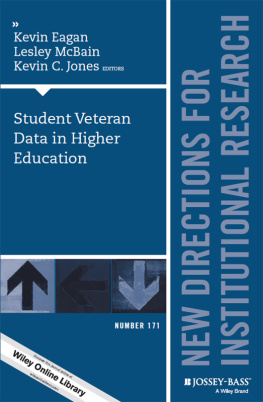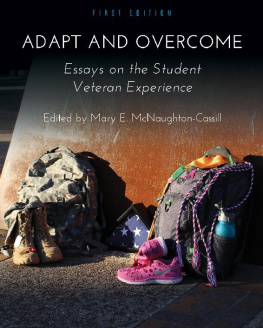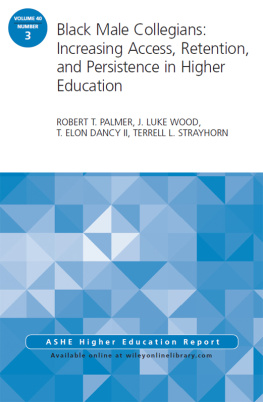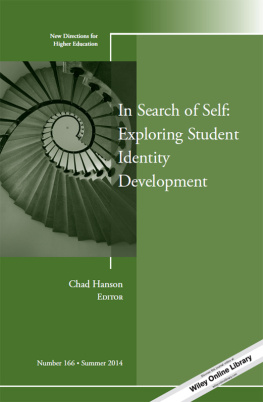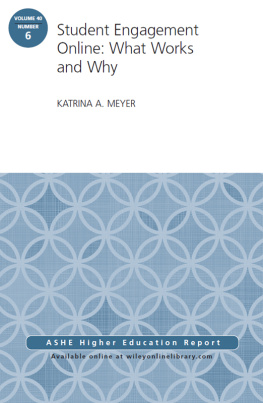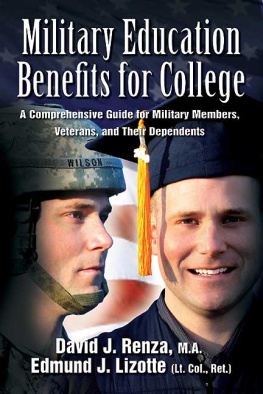
Student Veteran Data in Higher Education
Kevin Eagan, Lesley McBain, and Kevin C. Jones (eds.)
New Directions for Institutional Research, no. 171
Editor: Gloria Crisp
NEW DIRECTIONS FOR INSTITUTIONAL RESEARCH, (Print ISSN: 02710579; Online ISSN: 1536075X), is published quarterly by Wiley Subscription Services, Inc., a Wiley Company, 111 River St., Hoboken, NJ 070305774 USA.
Postmaster: Send all address changes to NEW DIRECTIONS FOR INSTITUTIONAL RESEARCH, John Wiley & Sons Inc., C/O The Sheridan Press, PO Box 465, Hanover, PA 17331 USA.
Copyright and Copying (in any format)
Copyright 2017 Wiley Periodicals, Inc., a Wiley Company. All rights reserved. No part of this publication may be reproduced, stored or transmitted in any form or by any means without the prior permission in writing from the copyright holder. Authorization to copy items for internal and personal use is granted by the copyright holder for libraries and other users registered with their local Reproduction Rights Organisation (RRO), e.g. Copyright Clearance Center (CCC), 222 Rosewood Drive, Danvers, MA 01923, USA (
Information for subscribers
NEW DIRECTIONS FOR INSTITUTIONAL RESEARCH is published in 4 issues per year. Institutional subscription prices for 2017 are:
Print & Online: US$461 (US), US$515 (Canada & Mexico), US$561 (Rest of World), 366 (Europe), 2890 (UK). Prices are exclusive of tax. AsiaPacific GST, Canadian GST/HST and European VAT will be applied at the appropriate rates. For more information on current tax rates, please go to www.wileyonlinelibrary.com/tax-vat. The price includes online access to the current and all online backfiles to January 1st 2013, where available. For other pricing options, including access information and terms and conditions, please visit www.wileyonlinelibrary.com/access.
Delivery Terms and Legal Title
Where the subscription price includes print issues and delivery is to the recipient's address, delivery terms are Delivered at Place (DAP); the recipient is responsible for paying any import duty or taxes. Title to all issues transfers FOB our shipping point, freight prepaid. We will endeavour to fulfil claims for missing or damaged copies within six months of publication, within our reasonable discretion and subject to availability.
Back issues: Single issues from current and recent volumes are available at the current single issue price from .
Disclaimer
The Publisher and Editors cannot be held responsible for errors or any consequences arising from the use of information contained in this journal; the views and opinions expressed do not necessarily reflect those of the Publisher and Editors, neither does the publication of advertisements constitute any endorsement by the Publisher and Editors of the products advertised.
Publisher:NEW DIRECTIONS FOR INSTITUTIONAL RESEARCH is published by Wiley Periodicals, Inc., 350 Main St., Malden, MA 021485020.
Journal Customer Services: For ordering information, claims and any enquiry concerning your journal subscription please go to www.wileycustomerhelp.com/ask or contact your nearest office.
Americas: Email: ; Tel: +1 781 388 8598 or +1 800 835 6770 (toll free in the USA & Canada).
Europe, Middle East and Africa: Email: ; Tel: +44 (0) 1865 778315.
Asia Pacific: Email: ; Tel: +65 6511 8000.
Japan: For Japanese speaking support, Email: .
Visit our Online Customer Help available in 7 languages at www.wileycustomerhelp.com/ask
Production Editor: Poornita Jugran (email: ).
Wiley's Corporate Citizenship initiative seeks to address the environmental, social, economic, and ethical challenges faced in our business and which are important to our diverse stakeholder groups. Since launching the initiative, we have focused on sharing our content with those in need, enhancing community philanthropy, reducing our carbon impact, creating global guidelines and best practices for paper use, establishing a vendor code of ethics, and engaging our colleagues and other stakeholders in our efforts. Follow our progress at www.wiley.com/go/citizenship
View this journal online at wileyonlinelibrary.com/journal/ir
Wiley is a founding member of the UNbacked HINARI, AGORA, and OARE initiatives. They are now collectively known as Research4Life, making online scientific content available free or at nominal cost to researchers in developing countries. Please visit Wiley's Content Access Corporate Citizenship site: http://www.wiley.com/WileyCDA/Section/id-390082.html
Address for Editorial Correspondence: Editorin chief, John F. Ryan, NEW DIRECTIONS FOR INSTITUTIONAL RESEARCH, Email:
Abstracting and Indexing Services
The Journal is indexed by Academic Search (EBSCO Publishing); Academic Search Alumni Edition (EBSCO Publishing); Academic Search Elite (EBSCO Publishing); Academic Search Premier (EBSCO Publishing); ERA: Educational Research Abstracts Online (T&F); ERIC: Educational Resources Information Center (CSC); Higher Education Abstracts (Claremont Graduate University); Professional Development Collection (EBSCO Publishing).
Cover design: Wiley
Cover Images: Lava 4 images | Shutterstock
For submission instructions, subscription and all other information visit:
wileyonlinelibrary.com/journal/ir
THE ASSOCIATION FOR INSTITUTIONAL RESEARCH (AIR) is the world's largest professional association for institutional researchers. The organization provides educational resources, best practices, and professional development opportunities for more than 4,000 members. Its primary purpose is to support members in the process of collecting, analyzing, and converting data into information that supports decision making in higher education.
Editors Notes
The passage of the Post-9/11 Veterans Educational Assistance Act of 2008, commonly known as the Post-9/11 G.I. Bill, created a surge in student veteran enrollment at colleges and universities across the United States. This was due to the bill's unprecedented educational benefits for qualifying veterans who served after September 10, 2001: in-state tuition and fees, a housing allowance, a book stipend, and an additional provision for voluntary matching funds agreements between institutions and the U.S. Department of Veterans Affairs (VA) to defray the cost of either out-of-state or private institutions tuition and fees. In addition, a new provision authorized qualifying servicemembers to transfer their Post-9/11 G.I. Bill benefits to dependents. The bill's passage has also created keen interest by various stakeholders (including but not limited to Congressional committees, veteran advocacy groups, and colleges and universities themselves) in how the billions of federal dollars authorized by the Post-9/11 G.I. Bill are being spent. This has led to increased scrutiny of, and requests for, data and research on student veterans.
However, although student veterans have been part of higher education for many decades, and The Servicemen's Readjustment Act of 1944 (the original G.I. Bill) is well-known as a watershed in higher education history, higher education researchers have not historically focused on them. This means that military-affiliated students (a term encompassing not only student veterans, but active-duty military studying in off-hours and dependents eligible for transferred benefits under the Post-9/11 G.I. Bill) have not historically been the subjects of large-scale postsecondary educational data collections. Further, these students characteristics have changed as the U.S. military has changed since the first G.I. Bill in 1944. Thus the study of military-affiliated students is unfamiliar terrain for most higher education researchers who do not possess a significant background in military affairs.
Next page
